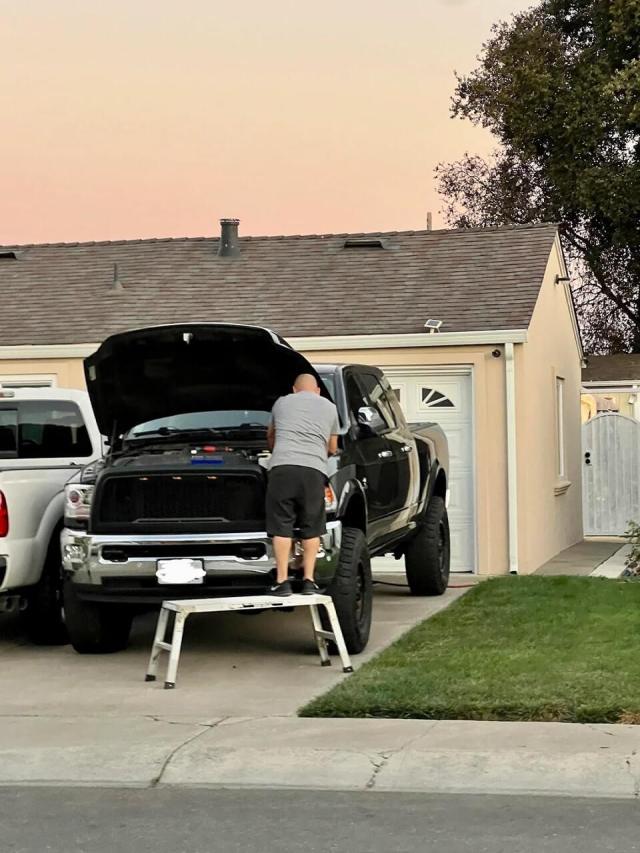A photo of a truck so humongous that its owner couldn't easily get under the hood sparked righteous indignation in the subreddit r/pics.
"Truck size is getting cartoonish at this point," the poster wrote, sharing an image of two trucks squeezed next to each other in a small driveway. A person stood on a nifty stool — not much smaller than a table — to access the engine compartment.

Other aspects of the photo caught commenters' eyes. The bigger truck clearly could not fit in the garage, and the other truck looked like it would be a tight fit. The roofs of the titanic vehicles approached the roofline of the house.
"I like how the trucks are parked head to foot," one user said, "otherwise the driver can't get out the door."
Ford and Chevrolet fans alike bemoaned the growing size of trucks.
"Finally wore out my 2002 F-150. Needed another long-bed truck, but couldn't find anything in my price range," the former recounted. "Settled on a 2011 F-150. I can't even touch the bottom tie-down rings in the corners. The side rails that used to be under my armpits are now above my shoulders. What the hell, Ford? Are you marketing exclusively to NBA centers?"
Watch now: Most sustainable thing about the new Rivian? The price tag
The latter wrote: "I had a little Chevy s-10 from 2002. I thought I'd check out the market for similar trucks now, only to discover they just don't exist. It's so frustrating."
Another user cited evidence from an article on The Drive about how unnecessary large trucks are, writing: "Most truck owners go months or years between using their truck for truck things. … I work with a couple of people who use their truck for truck things weekly. No one would have a problem with them having a truck.
"But most people have a vehicle with a much higher chance of killing people on impact, horrible visibility when driving, and horribly inefficient simply because it makes them feel big and strong."
These are proven problems with sport utility vehicles, vans, and even light trucks, which are exempt from federal bumper regulation because it could compromise vehicle utility in loading ramp and off-road situations, according to the National Highway Traffic Safety Administration.
But that's a strawman. How many truck owners tow, haul, or go off-roading more than once a year and might potentially benefit from a bigger vehicle? Only about 30%, per The Drive, and it's not as if the previously normal size for trucks can't handle most "truck things" either.
"When asked for attributes that are important to them, truck owners oversample in ones like: the ability to outperform others, to look good while driving, to present a tough image, to have their car act as extension of their personality, and to stand out in a crowd," Alexander Edwards, president of research-based consultancy Strategic Vision, said.
Yes, it's as ridiculous as it sounds. It's fully understandable to like the look and feel of a truck, as well as the flexibility one can provide. But trucks are more expensive than most other vehicles, and these bigger ones in particular guzzle gas. Even if truck owners are not inclined to start walking, biking, or taking public transportation instead, turning to cars or electric vehicles would save them thousands of dollars.
Electric trucks are becoming more and more common, like the F-150 Lightning, Rivian R1T, and Tesla Cybertruck, but even those are on the large side, with the Cybertruck and R1T clocking in at slightly more reasonable heights and lengths, respectively. All three do at least check in on the lower end for ground clearance among modern pickups (under 9 inches apiece, compared to the Ram 2500's 14.2 inches), which does help with the safety concerns for seeing children.
As the world searches for climate solutions, downsizing in this respect and others would benefit the planet by reducing human-produced toxic gases that envelop Earth and contribute to rising temperatures and extreme weather events. In turn, everyone can join the movement to encourage respect for Mother Nature.
You can do your part by channeling moral outrage about this situation into educating family and friends, steering individuals toward engaging with climate solutions while driving progress toward a safer, cleaner future.
Join our free newsletter for easy tips to save more, waste less, and help yourself while helping the planet.









